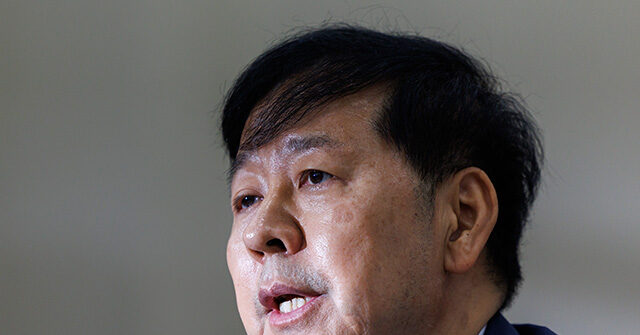The government of South Korea confirmed on Friday that officials in the administration of President Donald Trump canceled talks scheduled for Friday intended to negotiate a new bilateral trade agreement, hours before Finance Minister Koo Yun-Cheol was set to board a plane to Washington.
The Trump administration cited a scheduling conflict for Treasury Secretary Scott Bessent, according to multiple South Korean news agencies, and reportedly canceled the talks via email. The cancellation occurs about a week before an August 1 deadline to come to an agreement or the United States will impose a 25-percent tariff on all South Korean goods entering the United States.
Secretary of the Treasury Scott Bessent speaks to President Donald Trump during a bilateral meeting with President Ferdinand Marcos Jr. of the Philippines, Tuesday, July 22, 2025, in the Oval Office. (Official White House Photo by Daniel Torok)
It also follows an unfruitful visit to America by National Security Office Director Wi Sung-lac, who sought a meeting with Secretary of State Marco Rubio but reportedly only managed a phone call. Seoul is attempting to tie the trade deal to President Trump’s concerns that the South Korean government does not pay enough for its own defense, relying on American taxpayers to foot much of the bill.
President Trump began renegotiating trade arrangements with every nation on the planet that does business with America in April. Most have been given an August 1 deadline to come to an agreement more favorable to the American people; President Trump made the trade changes in response to what he described as years of unfair trade imbalances for Americans. Only five countries – the United Kingdom, the Philippines, Japan, Indonesia, and Vietnam – have completed trade negotiations and agreed upon new deals with Washington at press time.
WATCH — Brooke Rollins Showcases the Reality of Unfair Trade Practices and Why Trump Is Prioritizing It:
The South Korean newspaper Dong-A Ilbo reported on Friday that the Trump administration canceled “all high-level meetings between South Korean economic and security officials and their American counterparts.” It was not immediately clear if all meetings were expected to be rescheduled. The newspaper quoted an unnamed Finance Ministry official as confirming, “The U.S. side sent an email apologizing multiple times and said they hoped to reschedule the meeting as soon as possible.”
The office of leftist President Lee Jae-myung, who took office in June after a tumultuous period of five presidents in six months, organized an emergency meeting on Friday to calibrate its trade strategy, led by Lee’s top chief of staff, Lang Hoon-sik.
Chief of staff for policy Kim Yong-beom moved to reassure the country that the Lee administration was working to meet the August 1 deadline to avoid the 25-percent tariff, insisting that the government was focusing on investment and agriculture in the talks.
“Both sides reaffirmed the importance of collaboration in strategic sectors like shipbuilding and semiconductors and agreed to work out concrete measures,” the South Korean news agency Yonhap reported. “They also reiterated their commitment to reaching a mutually beneficial agreement before August 1.
President Trump has complained that South Korea’s barriers to American imports remain too high, particularly for agricultural products, and has urged Korean corporations to invest more in manufacturing and other activities in America. According to Dong-A, the South Korean government has been especially reticent to allow more imports of American rice and beef, facing significant pressure from domestic farmers and ranchers.
WATCH — Exclusive – Treasury Secretary Bessent Details Trump’s Tariff Plan to Bring Companies Back to USA:
Following the canceled meetings on Friday, the Korean presidential office confirmed that, for the first time, it was open to discussing agricultural product imports to Korea. Statements from the office did not clarify if the most controversial products, American rice and beef, were part of the talks.
“The Korean government has reportedly steered clear of politically sensitive issues such as opening its rice and beef markets,” Dong-A detailed, “instead proposing a package of purchases and investments across the shipbuilding, automotive, semiconductor, and energy sectors. Seoul also attempted to link the trade talks with security discussions, including a proposed hike in defense spending.”
While the scheduled meeting with Bessent fell through, Industry Minister Kim Jung-kwan and Trade Minister Yeo Han-koo did meet with U.S. Commerce Secretary Howard Lutnick in Washington on Thursday to discuss, among other issues, South Korean investment in American manufacturing.
“We will make every effort to ensure that our companies are not placed at a disadvantage compared to competitors from other countries,” the industry minister said in a statement following the meeting. “The trade delegation will mobilize all its capabilities to achieve the best possible result in terms of national interest by Aug. 1.”
Yonhap reported, citing anonymous “diplomatic sources,” that Foreign Minister Cho Hyun and Secretary of State Rubio are scheduled to meet next Thursday, the day before the August 1 deadline. Rubio, who also serves as national security adviser, is tied to the trade negotiations as a result of South Korea seeking to tie greater defense investment into the overall trade deal. Seoul previously sent National Security Adviser Wi Sung-lac to Washington in early July.
In remarks on Thursday during a visit to the Federal Reserve, Trump indicated that he would seek greater concessions from every country still negotiating, presumably including South Korea.
“If you pay like Japan, tariffs can be lower,” Trump said, referring to “paying” via investment in the U.S. market. “I would allow other countries to pay and buy [tariffs] down … Market opening is more valuable than the $550 billion Japan paid.”
Follow Frances Martel on Facebook and Twitter.
Read the full article here


